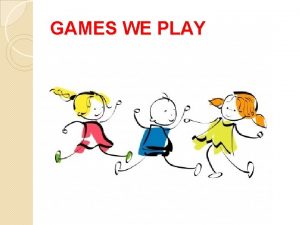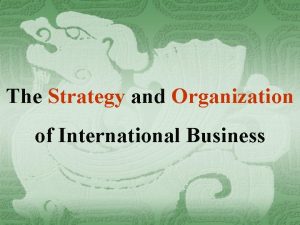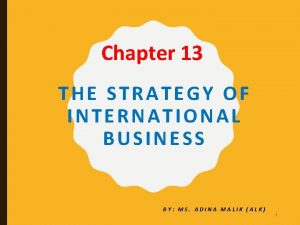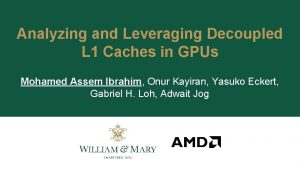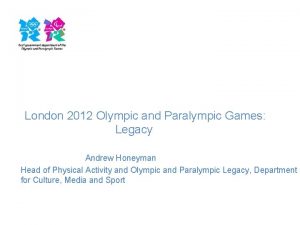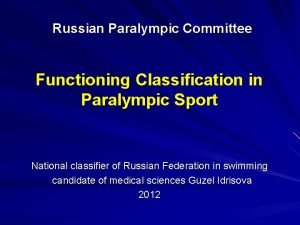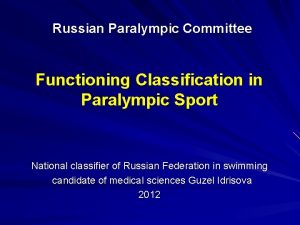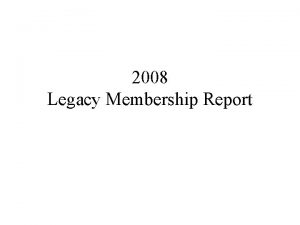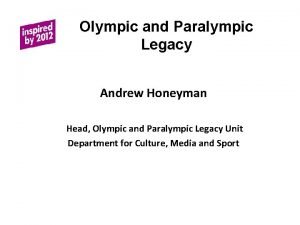Leveraging the London 2012 Paralympic Games What legacy









- Slides: 9

Leveraging the London 2012 Paralympic Games: What legacy for people with disabilities? By Ian Brittain and Aaron Beacom Brittain, I. & Beacom, A. (2016). Leveraging the London 2012 Paralympic Games: What legacy for people with disabilities? Journal of Sport and Social Issues, 40(6), 499 -521. Pre-publication copy available from: https: //pureportal. coventry. ac. uk/en/publications/leveraging-thelondon-2012 -paralympic-games-what-legacy-for-peopl-2

Learning Objectives • To critically examine claims made for Paralympic legacy • To assess the impact of, and the impact on, wider public policies regarding and attitudes towards disabled people • To assess the impact of (dis)ableism upon the legacy process

Introduction and Problem Statement The International Paralympic Committee, UK Government and the Organising Committee for the London 2012 Olympic and Paralympic Games all contended that the London 2012 Paralympic Games would positively impact the lives of disabled people in the UK, particularly with regard to changing non-disabled attitudes towards disability. All three have claimed partial success during the course of the four-year period (Olympiad) separating the London and Rio Paralympic Games. However, this is at odds with the findings of Disabled People’s Organisations (DPOs) and the experiences of disabled individuals. This paper, considers the claims of both sides against a backdrop of public policies that are targeting large scale benefits cuts, the media coverage of which actually appears to be hardening attitudes towards anyone on benefits and negating any positive impacts from the Games themselves.

Literature Review / Theory The underpinning theory for this paper is ableism which according to Wolbring (2012) “describes prejudicial attitudes and discriminatory behaviours toward persons with a disability. Definitions of ableism hinge on one’s understanding of normal ability and the rights and benefits afforded to persons deemed “normal”” (p. 78). In the context of sport for disabled people the prioritisation of non-disabled sport within society devalues sport for disabled athletes and potentially undermines much of the hard work done by disability activists to gain acceptance for disabled people in all walks of life.

Methodology The paper is based upon secondary data collection sources such as research reports and claims made for the impact of the London 2012 Paralympic Games and directly compares those claims made by the UK government and the London organising committee with those made by disabled people’s organisations. The paper adopts a historical perspective on the development of legacy -based foundations upon which the disability sport and Paralympic movements originated.

Findings and Discussions • This paper, considers the claims of both sides against a backdrop of public policies that are targeting large scale benefits cuts, the media coverage of which actually appears to be hardening attitudes towards anyone on benefits and negating any positive impacts from the Games themselves. • It argues that the continued predominance of ‘ableist’ perspectives on disability underpins many of the challenges faced by disabled people. • It contends that the gradual move towards an elite ‘Olympic’ sports model of competition has actually served to undermine the legacybased foundations of the Paralympic and disability sport movement.

Conclusions • Sports mega-events do not take place in a vacuum. They are subject to wider social, economic and political dynamics and, as such, it is extremely challenging to effectively plan for legacy. • It is clear that the austere economic situation, combined with UK government plans for benefit cuts and the media reporting of these cuts had a negative impact upon attitudes towards disability manifesting in a hardening of attitudes towards anyone who requires state -aided financial assistance to survive. • The worldwide media coverage of recent Paralympic Games present a strong platform from which to start a debate around disability issues. There is no other current platform that provides such an opportunity to reach so many non-disabled people who are otherwise generally oblivious to disability issues other than the little, frequently politically charged, information they receive through the newspapers or the often ableist views they are socialised into whilst growing up. • While there are indications that the Paralympic Games does have agency in the sense that it provides a platform from which to engage in debate about disability issues, one important lesson for future hosts is that heightened expectations can create as many problems as they solve.

References Wolbring, G. , 2012, Expanding Ableism: Taking down the Ghettoization of Impact of Disability Studies Scholars, Societies, Vol 2; p. 75 -83.

Critical questions to stimulate debate • Can sport really impact upon attitudes towards wider social issues? • Does the Paralympic Games really change attitudes towards all disabled people or possibly just athletes with disabilities? • How can future Paralympic host cities better ensure that they have a stronger possibility of achieving their legacy aims?
 Paralympics vs special olympics
Paralympics vs special olympics What are the olympic and paralympic values
What are the olympic and paralympic values What makes london olympic 2012 exceptionally sensational
What makes london olympic 2012 exceptionally sensational Hunger games chapter 27 questions and answers
Hunger games chapter 27 questions and answers Outdoor games and indoor games
Outdoor games and indoor games Three lines of defense
Three lines of defense There is low interdependence performance ambiguity
There is low interdependence performance ambiguity Chapter 13 the strategy of international business
Chapter 13 the strategy of international business Leveraging brand equity
Leveraging brand equity Analyzing and leveraging decoupled l1 caches in gpus
Analyzing and leveraging decoupled l1 caches in gpus




